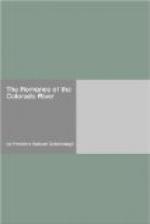afforded. The father became one of the trustees
and Powell entered the preparatory classes. With
intervals of teaching and business pursuits, he continued
here till 1855, when, largely through the influence
of the late Hon. John Davis, of Kansas, he entered
the preparatory department of Illinois College at
Jacksonville, Illinois. Thus far he had shown
no special aptitude for the natural sciences, though
he was always a close observer of natural phenomena.
His ambition at this period, which was also in accord
with the dearest wishes of his parents, was to complete
his college course and enter the ministry. Illinois
College not possessing a theological atmosphere after
a year spent there he departed, and in 1857 began
a course of study at Oberlin College, Ohio. Among
his studies there was botany, and in this class Powell
at last discovered himself and his true vocation—the
investigation of natural science. He became an
enthusiastic botanist and searched the woods and swamps
around Oberlin with the same zeal and thoroughness
which always characterised his work. He made an
almost complete herbarium of the flora of the county,
organising the class into a club to assist in its
collection. In the summer of 1858, having returned
to Wheaton, Illinois, where the family had settled
in 1854, he joined the Illinois State Natural History
Society, then engaged in conducting a natural history
survey of the State through the voluntary labour of
its members. To Powell was assigned the department
of conchology. This work he entered upon with
his usual application and made the most complete collection
of the mollusca of Illinois ever brought together
by one man. Incidentally, botany, zoology, and
mineralogy received attention, and in these lines he
secured notable collections. With the broad mental
grasp which was a pronounced trait, he perceived that
these studies were but parts of the greater science
of geology, which he then announced, to at least one
of his intimate friends, was to be the science to which
he intended to devote his life. The next year
was given to study, teaching, and lecturing, usually
on some topic connected with geology.
In the spring of 1860, on a lecturing tour, he visited some of the Southern States, and while there closely observed the sentiment of the people on the subject of slavery, with the result that he expressed the conviction that nothing short of war could settle the matter. In the summer of 1860 he became principal of the public schools of Hennepin, Illinois. These he organised, graded, and taught with a vigour which was characteristic, yet never forgetting his geological investigations in the neighbouring country, where, on Saturdays and at other times when the schools were not in session, he made botanical and zoological collections.




